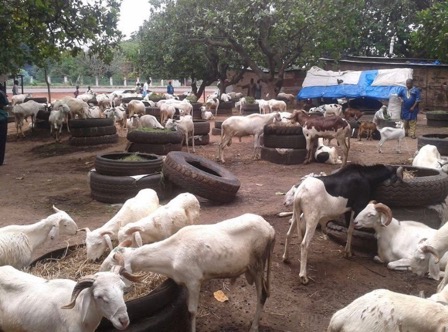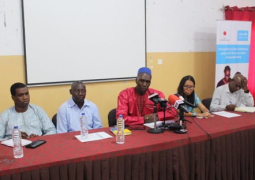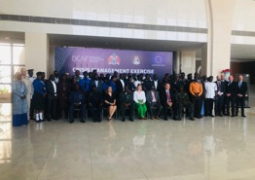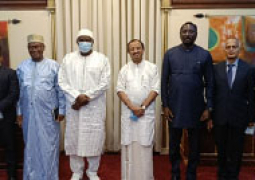
Buyers approached the sellers, who were quick to point fingers at the high rate of the CFA. They explained that their purchases in Senegal, where the CFA was stronger, had forced them to raise prices to cover their costs.
Speaking to The Point, a seller in Bakau, Ali Janha, 56, who purchased his rams from Missira in Senegal, lamented that they struggle to bring rams to The Gambia.
“We buy these rams using the CFA, and we are all aware of how high the price of CFA is going by the day,” he explains. “You cannot buy a good ram for D20,000 in Senegal thus, you should bear in mind the travelling expenses, feeding and other taxes. Therefore, we should not be blamed for the price hikes. The CFA rate should be blamed.”
Abdoulie Gaye, also a buyer from Banjul, said he intended to buy a ram for his family, but “the prices are very expensive” this year. “I have been going round to see if I can get an affordable ram for Tobaski, but I cannot still see one that I can buy,” he said, pleading: “I am urging the dealers to lower the prices for people to be able to afford the rams.”
Babucarr Kujabi, also a buyer, said: “I have seen a ram sold at D25,000. This is not reasonable at all. An average Gambian cannot afford to buy a ram at that price.”
Mr Kujabie said Gambians should start to rear rams; otherwise, “average Gambians will not be able to buy rams for their Tobaski in the future”.
Ebrima Drammeh, another buyer, said it is better to buy a cow than to buy a ram this year.
“A ram barely fit for consumption, in my opinion, is sold at D15,000,” he lamented.
For his part, Muhammad Sillah, a seller who has been in the ram business for over five years, said rams are quite scarce this year compared to last year.
“Last year we had so much rams because the CFA rate was normal and I was able to purchase as much as I could. However, this year myself and my colleague sellers I spoke to said the same thing - about how scarce rams are,” he said.
He also said that if buyers could not buy early, some might not have the type they desire.
He called on the government to address the skyrocketing rate of the CFA to ease business on them and their consumers.
Kabba Tamba, a Gambian national who sells rams, noted that at this moment of the business, most of the customers only pass by to ask about price of ram and proceed without buying. He said some said they could not buy yet because “they do not have a space to keep the rams before the Tobaski Feast”. He said he was optimistic that there would be sales at the end of the day.
He said he bought some of his rams from Wassu in Central River Region and others from Senegal and then transported them to the Greater Banjul Area for resale.
He urged the government to support the youth who want to venture into the business of ram sales, saying that some youth are into it while others are willing to but do not have the capital to start the business.
Omar Nyang, a Senegalese national, said he is able to venture into the business annually. He however complained about the CFA exchange rate, which, he said, is pretty high.
He commended the Gambia government and its people for their cooperation and positive interactions, saying the only challenge they encounter is at the border as they would be asked to pay for the “laissez-passe” document before entering the Gambian soil.
He said the prices of his rams vary from D25,000 to 30,000, adding that each ram has its own price depending on their sizes.
Recently the Ministry of Trade, Industry, Regional Integration and Employment (MOTIE) held consultative meeting with all the relevant stakeholders in the livestock sector which was organised in May 2024. The meeting was to facilitate the importation and sales of livestock in preparation for the Tobaski feast. The meeting yielded positive outcome for livestock importers and sellers.
The ministry tasked the Gambia Revenue Authority (GRA) to waive all import duties and domestic taxes on livestock during the period.
According to the Trade ministry, “The GPA Ferry Services will reduce the fees for ferry crossing by 50%. All livestock dealers with more than five animals are required to transport their animals in a vehicle during the ferry crossing.
“The Gambia Immigration Department will facilitate entry of the dealers into the country and where necessary will issue laissez passe free of charge to anyone from the ECOWAS Region without delay.”
“The Gambia Police Force will reinforce security during the period especially at the designated sales points.
“The Kanifing Municipal Council will also waive fees and taxes for the livestock dealers except for the cleaning fees.
“The Banjul City Council and the Brikama Area Council will waive all fees and taxes for livestock dealers during the period.”
The ministry urged all livestock dealers in the country to at all times have with them relevant documents such as an ID card, laissez-passe, or any other form of identification for easy identification purposes.
The Trade Ministry thus calls on all livestock dealers to ensure the positive steps agreed upon are reflected in the prices of livestock.





